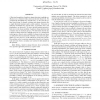Free Online Productivity Tools
i2Speak
i2Symbol
i2OCR
iTex2Img
iWeb2Print
iWeb2Shot
i2Type
iPdf2Split
iPdf2Merge
i2Bopomofo
i2Arabic
i2Style
i2Image
i2PDF
iLatex2Rtf
Sci2ools
120
click to vote
ICASSP
2009
IEEE
2009
IEEE
Quickest change detection in multiple on-off processes
A Bayesian formulation of quickest change detection in multiple onoff processes is obtained within a decision-theoretic framework. For geometrically distributed busy and idle times, we show that the optimal joint design of channel switching and change detection has a simple threshold structure under a mild condition. Extensions to arbitrarily distributed busy and idle times, in particular, heavy tail distributions, are discussed. We show that this problem presents a fresh twist to the classic problem of quickest change detection that considers only one stochastic process. We demonstrate that the key to quickest change detection in multiple processes is to abandon the current process when its state is unlikely to change in the near future (as indicated by the measurements obtained so far) and seek opportunities in a new process to avoid realizations of long busy periods. This problem arises in spectrum opportunity detection in cognitive radio networks where a secondary user searches fo...
ICASSP 2009 | Idle Times | Multiple Onoff Processes | Quickest Change Detection | Signal Processing |
Related Content
| Added | 21 May 2010 |
| Updated | 21 May 2010 |
| Type | Conference |
| Year | 2009 |
| Where | ICASSP |
| Authors | Qing Zhao, Jia Ye |
Comments (0)

